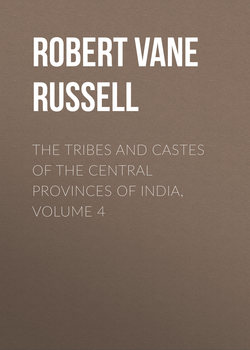Читать книгу The Tribes and Castes of the Central Provinces of India, Volume 4 - Robert Vane Russell - Страница 36
Part II
Articles on Castes and Tribes
Kumhār—Yemkala
Vol. IV
Kunbi
23. The Kunbi as cultivator
ОглавлениеThe Kunbi has the stolidity, conservative instincts, dulness and patience of the typical agriculturist. Sir R. Craddock describes him as follows39: “Of the purely agricultural classes the Kunbis claim first notice. They are divided into several sections or classes, and are of Marātha origin, the Jhāri Kunbis (the Kunbis of the wild country) being the oldest settlers, and the Deshkar (the Kunbis from the Deccan) the most recent. The Kunbi is certainly a most plodding, patient mortal, with a cat-like affection for his land, and the proprietary and cultivating communities, of both of which Kunbis are the most numerous members, are unlikely to fail so long as he keeps these characteristics. Some of the more intelligent and affluent of the caste, who have risen to be among the most prosperous members of the community, are as shrewd men of business in their way as any section of the people, though lacking in education. I remember one of these, a member of the Local Board, who believed that the land revenue of the country was remitted to England annually to form part of the private purse of the Queen Empress. But of the general body of the Kunbi caste it is true to say that in the matter of enterprise, capacity to hold their own with the moneylender, determination to improve their standard of comfort, or their style of agriculture, they lag far behind such cultivating classes as the Kirār, the Rāghvi and the Lodhi. While, however, the Kunbi yields to these classes in some of the more showy attributes which lead to success in life, he is much their superior in endurance under adversity, he is more law-abiding, and he commands, both by reason of his character and his caste, greater social respect among the people at large. The wealthy Kunbi proprietor is occasionally rather spoilt by good fortune, or, if he continues a keen cultivator, is apt to be too fond of land-grabbing. But these are the exceptional cases, and there is generally no such pleasing spectacle as that afforded by a village in which the cultivators and the proprietors are all Kunbis living in harmony together.” The feeling40 of the Kunbi towards agricultural improvements has hitherto probably been something the same as that of the Sussex farmer who said, ‘Our old land, it likes our old ploughs’ to the agent who was vainly trying to demonstrate to him the advantages of the modern two-horse iron plough over the great wooden local tool; and the emblem ascribed to old Sussex—a pig couchant with the motto ‘I wun’t be druv’—would suit the Kunbi equally well. But the Kunbi, too, though he could not express it, knows something of the pleasure of the simple outdoor life, the fresh smell of the soil after rain, the joy of the yearly miracle when the earth is again carpeted with green from the bursting into life of the seed which he has sown, and the pleasure of watching the harvest of his labours come to fruition. He, too, as has been seen, feels something corresponding to “That inarticulate love of the English farmer for his land, his mute enjoyment of the furrow crumbling from the ploughshare or the elastic tread of his best pastures under his heel, his ever-fresh satisfaction at the sight of the bullocks stretching themselves as they rise from the soft grass.”
Carrying out the dead
39
Nāgpur Settlement Report, para. 45.
40
The references to English farming in this paragraph are taken from an article in the Saturday Review of 22nd August 1908.
